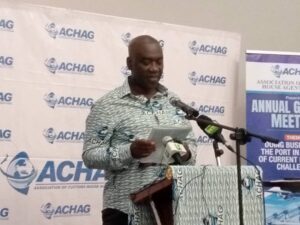Group appeals to government to remove outdated taxes on port clearance

The Association of Customs Housing Agents Ghana (ACHAG), has appealed to the government to remove outdated taxes on port clearance of goods to make Ghana’s ports more competitive.
Mr. Yaw Kyei, the outgoing president of ACHAG, made the appeal and questioned the reasons behind the COVID-19 health recovery levy and the Ministry of Health Disinfection fee.
Mr. Kyei, speaking at ACHAG’s third Annual General Meeting (AGM), said, “What could be the reason for the government still holding on to the outdated COVID-19 health recovery levy? Of what benefit is it to the Ghanaian for the government to hold on to the Ministry of Health Disinfection fee?
Network charge of 0.04 per cent on the Free on Board (FoB) and its related VAT charges, who is the recipient, and for what justification is this tax in place.?”
He was speaking at a meeting on theme, “Doing business at the ports in the face of current economic challenges.
He said there were a lot more fees, levies, and taxes, and that ACHAG believed the government should reconsider its existence and implementation, adding that it was taking a toll on businesses in Ghana.
He noted that the pressure on the ports to generate enough money to finance the national budget, led to increased taxes to achieve targets as a convenient move, was reflected in the numerous challenges seen at the various ports of entry in the country.
“High costs of doing business at the ports may result in high inflation, smuggling, corruption, a reduction in the purchasing power of importers and exporters, diversion of imports through neighbouring countries on a financial competitive basis, intensification of malpractice, for example, under-invoicing, misdescription, cutting down on imports, and its multiplier effects on imports and government revenue,” he stressed.
Mr. Kyei stated that apart from the Customs Division of the Ghana Revenue Authority (GRA) raping in so much for the state, there were other government and quasi-government bodies at the ports adding up to the cost of doing business.
He said the bodies include the Food and Drugs Authority, the Ghana Standard Authority, the Environmental Protection Agency, the Minerals Commission, the Ministry of Food and Agriculture, the National Petroleum Authority, the Ghana Atomic Energy Commission, and Ghana Health Services.
He explained that the state derived its revenue at the ports from duties, taxes, fees, and levies via the Customs declaration, or the Bill of Entry, indicating that some included import duty, import special TAC, import excise duty, ECOWAS levy, mining levy, rent charges, customs penalty, fines, overtime charges, manifest amendment, manufacturer licensee.
The outgoing ACHAG president said another source of concern was the shipping line charges, terminal charges, costs from consolidators, and the high cost of transportation of the cleared goods.
Mr. Alhassan Suleman Tampuli, the Deputy Minister for Transport, said the government was committed to improving the maritime and port sectors, therefore investing in infrastructure, technology, and an efficient transport sector to ease the doing of business at the various ports.
Mr. Tampuli said a committee had been constituted under the Economic Management Team tasked with the responsibility of making recommendations on how to reduce the cost of doing business at the ports, having listened to the concerns of various stakeholders in the port value chain.
Source: GNA
